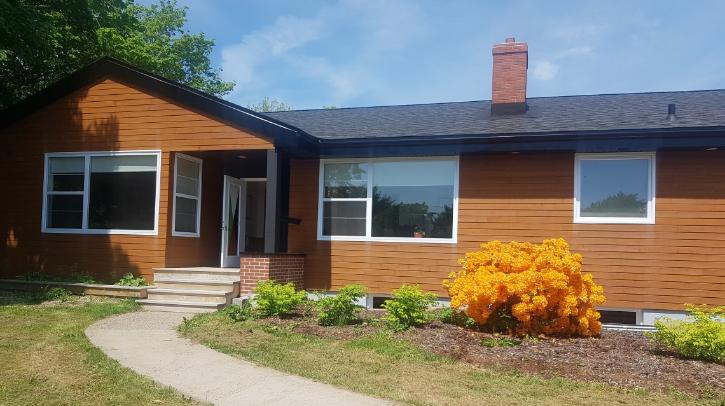Juniper House

Welcome to Juniper House -- the home, gathering space, and heart of the Indigenous Student Resource Centre. Juniper House is more than just a resource centre, it is a home away from home for students, and a space to build community and connections during your post-secondary journey. It is a place for Indigenous students to gather, work and thrive in an inclusive community that honours the diverse experiences and knowledges of Indigenous peoples.
Juniper House is home to the St. John’s Campus Indigenous Student Resource Centre staff offices, and the services and programs we provide.
Juniper House offers students an array of spaces to socialize as well as study, which include:
- Social room - a casual student gathering space that is also used for cultural activities. This room has plenty of comfortable seating with tables, casual workspace and a mersive pod.
- Computer lab - equipped with seven computers and a printer and photocopier.
- Elder's space - this also functions as a quiet space with a seating area with a computer station. This area is for use by visiting Elders, and when available may also be used by students as a quiet space to relax or study.
- Multimedia room - a flexible space that can act as a meeting space, classroom, seminar space, or activity room. The multimedia room is equipped with easily arranged tables and chairs, and technology such as a TV and SMART Board.
- Kitchen - a fully functioning kitchen where students have access to a microwave, fridge, tea and coffee, and a welcoming space to sit and eat.
- Two gender-neutral, single occupant bathrooms.
Juniper House is a former private residence that has been retrofitted, therefore it is not fully accessible but every effort has been made to provide enhanced accessibility. There is ramp access at the back of the house, one bathroom, and all other spaces with the exception of the multipurpose room offering enhanced accessibility.
Juniper House is located at 208 Elizabeth Avenue and open to students Monday through Friday, 9am - 4pm.
Juniper House is the result of a dedicated student-led initiative; there was a pressing need for a space that could accommodate the diverse programming and services offered to Indigenous students at Memorial University's St. John's Campus. A suitable space was identified in February 2019, and renovations to adapt the structure to our needs started soon after. In November 2019 we met with students to discuss details like furniture, computer set up, and the name of the house. We wanted a name that reflected the Indigenous student experience at Memorial University, and our distinct histories and cultures.
Juniper was chosen as it is a circumboreal plant that grows in diverse environments across Newfoundland and Labrador; it is present across the territories and traditions of the Innu, Inuit, and Mi'kmaq.
Juniper is a medicinal plant that can be used to treat an array of ailments, and it also has aromatic, craft, and culinary uses - Juniper House is similarly multifaceted. Not only is it a resource and study space, it is a home away from home, offering a safe and inclusive space of care to help heal whatever pains the university journey may bring. It's a place of connection fostered through community building events, sharing food, and creating crafts.
Juniper plants thrive in a variety of environments and conditions - from woods, to barrens, to hillsides. They can be found at the top of the northern treeline, and they are a part of the highest mountain treeline in the world (16 000ft in the Himilayas). Adaptable to diverse conditions the juniper thrives, growing strong wood and producing tough seeds that can endure for years and be dispersed over great distances - just like our students who will spend years studying, often far from home.
Juniper is recognizable, visually and linguistically - while Innu-aimun, Inuttitut, and Mi'kmaq all have their own words for juniper, in English juniper does not have the same number of regional colloquialisms as other medicinal plants (e.g. crowberries, partridgeberries, redberries, blackberries, etc.). The needles and 'berries' (they are actually modified conifer cones) are difficult to confuse with those of other plants. This unique presence extends to Juniper House, which is equally identifiable as a distinctly Indigenous space within the greater University landscape.
As we settle into our new space we plan to create a medicine garden, which already includes two juniper plants. Juniper will be present in the space and lives of students, a symbol of our strength, connection, traditions, and knowledges.